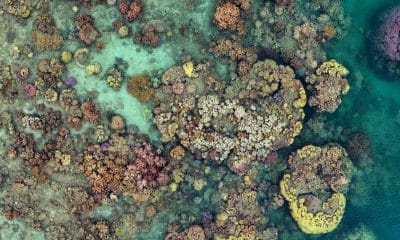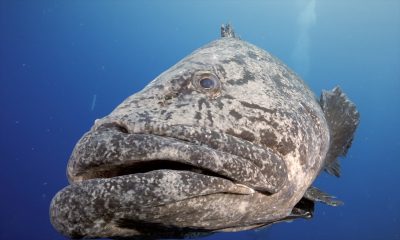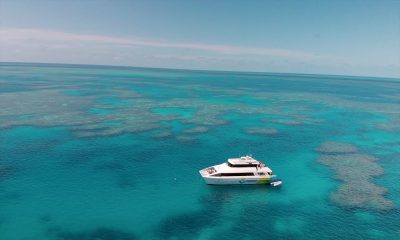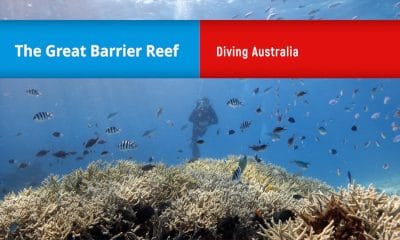News
Plan won’t save Great Barrier Reef say Australian scientists
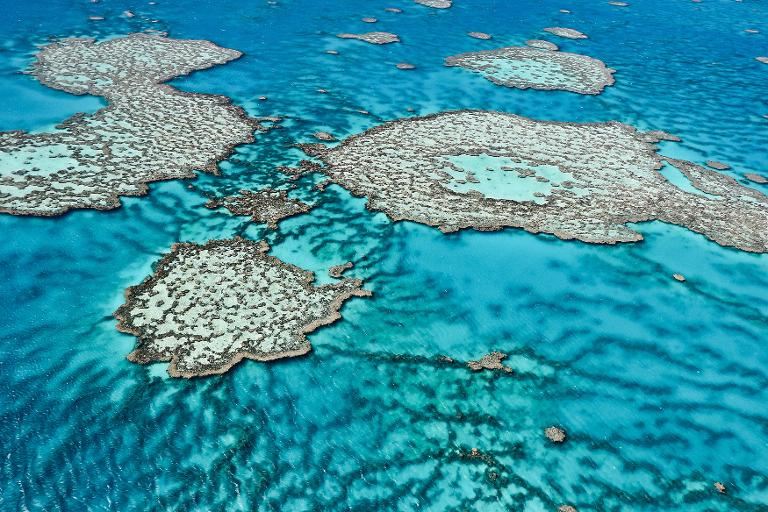
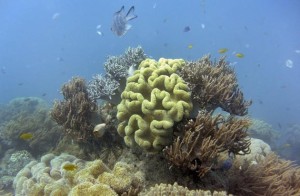 The Australian government’s plans to protect the Great Barrier Reef are inadequate, short-sighted and will not prevent its decline, the country’s leading group of natural scientists said today.
The Australian government’s plans to protect the Great Barrier Reef are inadequate, short-sighted and will not prevent its decline, the country’s leading group of natural scientists said today.
The draft plan, released for consultation last month, was supposed to diminish concerns by the United Nations about the reef’s health after UNESCO threatened to put it on the World Heritage “in danger” list.
Environment Minister Greg Hunt has said the proposal reflects an effort to balance the priorities of protecting the reef, which is teeming with marine life, and long-term sustainable development.
But the Australian Academy of Science warned that the plan ignored the impact of climate change and failed to address problems with poor water quality, coastal development and fishing.
“The science is clear: the reef is degraded and its condition is worsening. This is a plan that won’t restore the reef; it won’t even maintain it in its already diminished state,” academy fellow Terry Hughes said.
“The plan also seems overly focused on the short-term task of addressing UNESCO’s concerns about the reef’s World Heritage Listing, rather than the longer-term challenges of restoring the values of the reef.”
Hughes said while the plan identified targets for reducing harmful agricultural run-off, any improvements would likely be lost in the unprecedented amount of dredging for coal ports and the Queensland state government’s plans to double agricultural production by 2040.
The survival of the reef depended on a reduction in pollution from run-off and dredging, less fishing and a decrease in carbon emissions from fossil fuels, he said.
A spokesman for Minister Hunt said the “Reef 2050 Long-Term Sustainability Plan” states the government’s vision to improve the health of the reef over successive decades.
“We note the Academy is calling for such a vision, and it is front and centre of what we are working to achieve,” he said.
He said the plan acknowledged that climate change was a global problem requiring global action, and was being addressed by the government through other policies.
The draft, prepared by the Australian and Queensland governments, calls for greater coordination between authorities in relation to the reef, a proposal welcomed by environmentalists.
It also urges a 10-year ban on dredging to develop new ports or to expand existing ones both inside and next to the World Heritage site – apart from in priority port development areas.
And it bans future port developments in the Fitzroy Delta, Keppel Bay and North Curtis Island near Rockhampton – areas of the reef described by environmentalists as key incubators of marine life.
But environmentalists have criticised the draft as not setting high enough targets for cutting agricultural pollution or providing the billions of dollars required to restore the health of the reef.
With the government’s final reef plan due in December, WWF Australia and the Australian Marine Conservation Society called for stronger action to protect the major tourist attraction.
“The reef is one of the world’s great natural wonders and we cannot allow it to be turned into an industrial park and a shipping super-highway,” campaigner Felicity Wishart said.
The colourful coral faces a number of pressures including climate change, poor water quality from land-based runoff, the crown-of-thorns starfish, which eat coral, and the impacts of fishing and coastal development.
Source: uk.news.yahoo.com
Gear News
Introducing the TR-80, IR-50 and CS-30 Regulators from DYNAMICNORD

Whether you are a beginner or a professional diver – with the three new main regulators from DYNAMICNORD, everyone will find their favourite regulator. They all look super stylish.
Excellent performance with the TR-80
Quality and performance are the be-all and end-all for regulators. It is not for nothing that the TR stands for Tec Reg. The innovative design of the TR-80 guarantees absolute reliability – even in ice-cold waters.

Perfect breathing effort at 0.8 J/l / certified for diving in waters below 10 degrees / structural design made of solid brass for best cold protection / membrane-compensated design with dry seal of the first stage / reduced exhalation effort thanks to optimized exhalation membrane and bubble deflector / adjustable Venturi (dive/predive) and adjustment knob for individual inhalation comfort / innovative design of the front cover prevents free-flow in strong currents or when diving with scooters / design made of sandblasted brass, matt chrome finish / 2 HP and 4 LP outlets / mouthpiece made of high-quality, anti-allergic silicone for maximum comfort.


Amazing underwater adventures with the IR-50
The IR-50 is the top regulator for advanced and experienced divers. Natural breathing is the essence of this regulator.

Ideal breathing effort at 0.8 J/l /certified for diving in waters below 10 degrees / compensated membrane / adjustable venturi (dive/predive) and adjustment knob for individual inhalation comfort/ outlet valve and deflector for minimum exhalation effort and reduction of bubbles on the face / design made of sandblasted brass, matt chrome finish / 2 HP and 4 NP outlets / mouthpiece made of high-quality, anti-allergic silicone for maximum comfort.


The Workhorse – our CS-30
For diving centres and diving beginners – the workhorse stands for strong construction, reliability and robustness. Perfect for your training.

Optimal breathing effort at 0.8 J/l /recommended for diving in waters above 10 degrees / non-compensated piston / adjustable venturi (dive/predive) / outlet valve and deflector for minimum exhalation effort and reduction of bubbles on the face / design made of sandblasted brass, matt chrome finish / 1 HP and 3 NP outlets / mouthpiece made of high-quality, anti-allergic silicone for maximum comfort.


Octopus OP-30
The OP-30 is the ideal addition to all DYNAMICNORD regulators. It is identical in construction to the CS-30.

The TR-80, IR-50, CS-30 (DIN & INT) regulators and the Octopus OP-30 are available from DYNAMICNORD dealers and in the online store.
DYNAMICNORD – Your Outdoor Companion.
Marine Life & Conservation
Paul Watson Released as Denmark Blocks Japan’s Extradition Bid

Renowned anti-whaling activist Paul Watson has been released from custody in Greenland after spending five months in detention. Denmark’s Justice Ministry rejected Japan’s request for his extradition, citing insufficient guarantees that his time already served in custody would be credited against any potential sentence.
The 74-year-old Canadian-American was arrested on July 21 in Nuuk, Greenland’s capital, when his ship docked to refuel. His arrest was based on a 2012 Japanese warrant related to a 2010 encounter in Antarctic waters. Japan alleged Watson obstructed operations and caused damage to a whaling research ship during efforts to disrupt illegal whaling. Watson has consistently denied these claims, maintaining his commitment to marine conservation.
Denmark, which oversees extradition matters for Greenland, concluded that while the legal conditions for extradition were met, the lack of assurances from Japan regarding time-served credit made extradition untenable.
In a video shared by his foundation, Watson expressed gratitude and relief, saying, “After five months, it’s good to be out… and good to know they’re not sending me to Japan.” He added that the most difficult part of his time in custody was being separated from his two young sons.
Watson is a pioneering figure in marine conservation, known for founding the Captain Paul Watson Foundation in 2022 after decades of activism with the Sea Shepherd Conservation Society. His bold efforts to defend marine life have earned him widespread support, including from celebrities and conservationists. His work has also been featured in the acclaimed reality TV series Whale Wars.
Watson’s lawyer, Jonas Christoffersen, praised the decision, stating, “We are happy and relieved that Paul Watson is now free.” He added that Watson is eager to reunite with his family and continue his vital work.
The arrest occurred while Watson’s vessel, the M/Y John Paul DeJoria, was en route to the North Pacific with a team of 26 volunteers to intercept a Japanese whaling ship. His foundation described the arrest as politically motivated and emphasized that Watson’s actions were focused on ending illegal whaling practices.
Japan resumed commercial whaling in 2019 after leaving the International Whaling Commission, asserting that whale meat is a cultural tradition. Conservationists, however, continue to challenge these practices, highlighting their impact on marine ecosystems.
Despite the challenges, Watson remains steadfast in his mission to protect marine life and bring attention to whaling practices. His dedication to ocean conservation has made him a globally respected advocate for the environment.
-

 News2 months ago
News2 months agoIconic SS United States to become the World’s Largest Artificial Reef
-

 News3 months ago
News3 months agoBook Review – 52 Assignments: Underwater Photography
-

 Gear News3 months ago
Gear News3 months agoDYNAMICNORD – New German diving brand enters the British market
-

 News3 months ago
News3 months agoExploring Cenote El Pit: A Diver’s Dream
-

 Gear News3 months ago
Gear News3 months agoTry BARE drysuits (and maybe even win one!) this Friday with Sea & Sea at North West Dive Fest
-

 Marine Life & Conservation3 months ago
Marine Life & Conservation3 months agoBook Review: Coral Triangle Cameos
-

 Blogs2 months ago
Blogs2 months agoDive the Egyptian Red Sea this Autumn with Regaldive
-

 News3 months ago
News3 months ago2024 Ocean Art Underwater Photo Competition Announced







